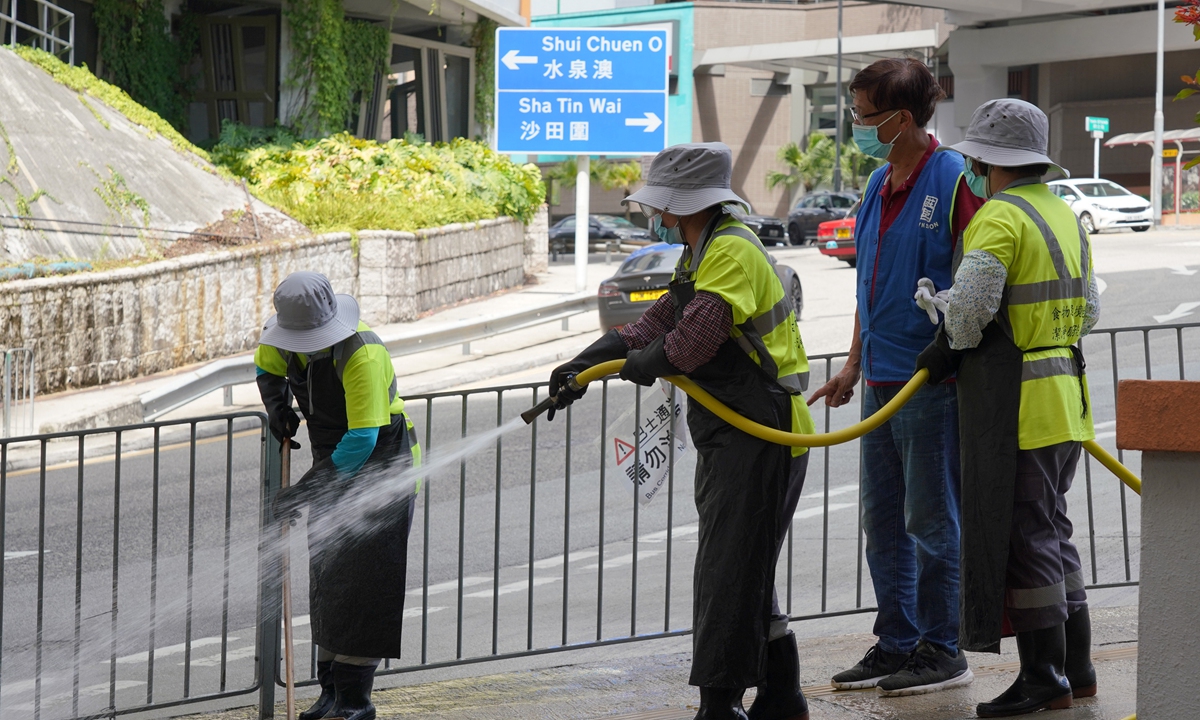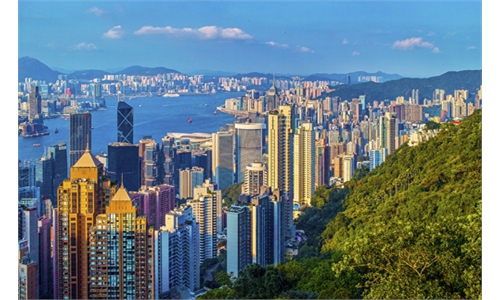HK ‘needs more tests’ to control third wave of pandemic
Central govt could help due to experience in Wuhan, Beijing: observer

Cleaners spray disinfectant fluid to clean the street at Sha Tin, Hong Kong on Saturday. A spike in cases indicates the city has been hit by a third wave of COVID-19. On Sunday, Hong Kong reported 38 newly confirmed cases. Photo: cnsphoto
Hong Kong's Center for Health Protection (CHP) reported 38 new COVID-19 cases as of Sunday afternoon with 30 locally transmitted and eight imported cases, bringing the number of confirmed COVID-19 cases in the Hong Kong Special Administrative Region (HKSAR) to 1,470.
The head of the Hong Kong CHP warned over the weekend that this is the most serious situation for the city since the pandemic started.
Observers suggested that the central government can provide meaningful assistance as the Chinese mainland has successful experience in controlling and preventing outbreaks or new waves of the pandemic in major cities with large populations like Wuhan and Beijing, and conducting more tests to cover all residents or at least specific regions is the key.
Chuang Shuk-kwan, head of the CHP's Communicable Disease Branch, said at a daily briefing on Sunday that 38 infections had been confirmed, including 30 local cases, and more than 20 people are still waiting to find out if they had the coronavirus. Health authorities have so far been unable to trace the source of infection in 13 of Sunday's confirmed cases, local media reported.
Chief Executive Carrie Lam said on Sunday on her Facebook account that before there is a successful vaccine or the public becomes immune to the virus after being infected, repeated outbreaks are unavoidable, so a reasonable and balanced strategy against the virus should be pursued.
The third wave of the pandemic in Hong Kong started last week. On Saturday, the city reported 28 more confirmed cases of COVID-19, including 16 local infections, and on Friday, there were 38 newly confirmed cases, including 32 community transmissions, after the city reported 42 cases on Thursday, the highest number in a single day the week.
Chuang said at a media briefing on Saturday afternoon that "Hong Kong is facing the most serious situation" since the COVID-19 pandemic started here.
Jin Dongyan, a professor at the School of Biomedical Sciences at the University of Hong Kong, suggested that the strain of coronavirus detected in Hong Kong may be from Europe or the US.
Hong Kong is now being hit by the third wave of the coronavirus, and it experienced a second wave in late February from a strain from Europe and the US. Jin said he believes this virus may be the same strain the city saw during the second wave.
According to data from Friday to Sunday, most cases reported in the new wave in Hong Kong were not imported. On Sunday, there were 8 imported cases out of 38 newly confirmed cases, followed by 12 imported infections out of 28 on Saturday and 6 out of 38 Friday.
"It's probably because there were some flaws in border procedures in Hong Kong, and some patients from overseas may have brought the virus to communities which resulted in the current local transmission," Jin noted.
The strain of the coronavirus detected in Hong Kong has a higher viral load but it is not causing severe symptoms, Jin said.
This situation to some extent is very similar to Beijing's situation in June, which caused 335 confirmed cases and zero deaths so far, and has been controlled within a month. This has made some analysts suggest that the city could consider seeking assistance from the central government and the mainland.
Victor Chan Chi-ho, vice chairman of the Hong Kong Association of Young Commentators, said "we all saw that Beijing conducted a mass testing campaign to cover millions of residents and temporarily shut down schools, bars and some markets, and put in place strict quarantine measures."
According to Beijing municipal authorities on July 6, more than 11 million people were tested in a month, and as of Saturday, Beijing has no new cases for six straight days.
The HKSAR government has not undertaken widespread community testing due to the shortage of testing capability, and Chan suggested that the HKSAR government could consider asking for help from the central government to send experts and more medical materials, including testing kits, to Hong Kong.
Hung Kam-in, convenor of the City Think Tank of Hong Kong, said this could be an opportunity for the central government to show its care for Hong Kong people's livelihoods and its significant role in protecting Hong Kong in every aspect, especially after the enactment of the national security law for Hong Kong.
However, Jin said there is no need to roll out citywide nucleic acid testing or for the medical help from the Chinese mainland yet, as Hong Kong has sufficient medical resources to deal with the third wave of the coronavirus.
The HKSAR government's Secretary for Food and Health Sophia Chan said on Saturday that the HKSAR government is trying to trace all confirmed cases and their contacts, and is working on testing certain groups such as staff at eldercare homes, taxi drivers and catering staff, Xinhua reported.
"We have also tightened social distancing measures," Chan said. "After we have continuously assessed the situation, we do not preclude that there will be other measures."



